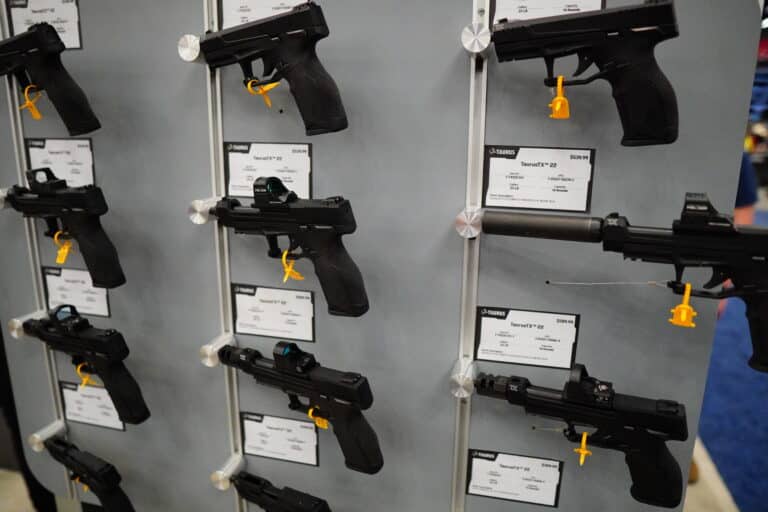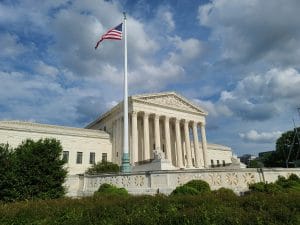A history of drunk driving is not a good enough reason to permanently bar somebody from owning a firearm.
That’s the ruling US District Judge John Milton Younge handed down on Tuesday. He found the government violated the rights of plaintiff Edward Williams, a Pennsylvania man who was convicted of driving under the influence, when it disarmed him. He decided the law prohibiting felons from possessing guns was unconstitutional, as applied to Mr. Williams.
“[T]he Court finds that the Government has not carried its burden in proving that the United States’ tradition of firearm regulation supports stripping an individual of their right to possess a firearm because they had previously driven while intoxicated,” Judge Younge wrote in Williams v. Garland. “The application of Section 922(g)(1) to Plaintiff, therefore, constitutes a violation of his Second Amendment rights, and the Court finds that Plaintiff is entitled to the requested relief.”
The ruling is the latest to find some of the federal restrictions on who can own a gun are too broad. It is also the latest to cast doubt on a federal gun law under the Second Amendment test set up in the 2022 Supreme Court case New York State Rifle and Pistol Association v. Bruen, which requires modern restrictions to be grounded in historical tradition. The outcome may also raise the stakes for the High Court’s current Second Amendment case, United States v. Rahimi, since it addresses the question of what kind of people can be barred from gun ownership under the Bruen test.
The Firearms Policy Coalition, which supported the case, said it was pleased with the decision.
“Mr. Williams is a peaceable person who should have never been disarmed,” Joseph Greenlee, the group’s director of constitutional studies, said in a statement. “The court correctly ruled that his Second Amendment rights should be restored.”
Terrence Clark, a spokesperson for the Department of Justice, declined to comment on the case. He did not say whether Attorney General Merrick Garland (D.) plans to appeal the decision.
The case stems from Williams’ 2005 conviction for driving while intoxicated. That conviction was a misdemeanor under Pennsylvania law, but it was enhanced because Williams had previously avoided a conviction for DUI in 2000 after agreeing to a diversionary program. That pushed his potential punishment up to five years in prison, which meant it qualified as a felony under the federal law restricting gun possession.
Williams never served any time in jail. Instead, he was sentenced to house arrest for 90 days and paid a $1,500 fine.
In 2017, he filed suit against the government, seeking to have his gun rights restored. In 2019, a federal judge ruled against him, and that decision was upheld on appeal in 2020. However, Williams filed for a rehearing in the wake of Bruen, and the Third Circuit vacated the initial ruling and remanded the case for rehearing in light of Bruen. The Third Circuit then found the same federal law was unconstitutional as applied to another non-violent felon in Garland v. Range.
“We agree with Range that, despite his false statement conviction, he remains among ‘the people’ protected by the Second Amendment,” Judge Thomas Hardiman, a George W. Bush appointee, wrote for an 11-4 majority that included two Biden, an Obama, and a Clinton appointee in Range. “And because the Government did not carry its burden of showing that our Nation’s history and tradition of firearm regulation support disarming Range, we will reverse and remand.”
The ruling in Range played a prominent role in Judge Younge’s findings.
“Prohibiting Plaintiff’s possession of a firearm due to his DUI conviction is a violation of his Second Amendment rights as it is inconsistent with the United States’ tradition of firearms regulation,” he wrote in Williams. “The Constitution ‘presumptively protects’ individual conduct plainly covered by the text of the Second Amendment, which includes an individual’s right to keep and bear arms for self-defense.”
Judge Younge was initially nominated to his post on the United States District Court for the Eastern District of Pennsylvania by President Barack Obama (D.) in 2015, but his nomination expired in 2017 because the Senate failed to vote on it. He was then renominated for the same role in 2018 by President Donald Trump (R.). He was eventually approved over the objection of some Republicans.
He said both sides in the case agreed there was no “historical twin” for the modern prohibition but noted that wasn’t necessary to uphold the law. Instead, he said the government had to produce historical regulations that restricted guns by the same sort of means for the same purpose. He gave the most consideration to early American laws allowing government officials to disarm drunk people but found they didn’t last nearly as long as their modern counterparts.
“[T]he Court finds the Government’s argument that Section 922(g)(1) can be appropriately applied to Plaintiff because of historical regulations on the possession of a firearm by a presently intoxicated person unavailing,” Judge Younge wrote. “The Government points to several regulations permitting the disarmament of drunk or intoxicated persons. None of these regulations allude to disarmament lasting beyond the individual’s state of intoxication, and none provided for permanent disarmament, as Section 922(g)(1) does. Certainly, this Court agrees that using a firearm while intoxicated is dangerous, but historical regulations which momentarily disarmed certain individuals for temporary mental incapacity cannot be considered similar to the sanction of permanent disarmament for past DUI convictions.”
Ultimately, he ruled the government failed to show there was a historical tradition of lifetime gun bans for people like Williams.
“In no way does the Court dispute the dangerousness of drunk driving or of combining firearm use and alcohol consumption, and it acknowledges that Plaintiff’s offenses were serious and his conduct during his convictions in 2004 and 2005 dangerous,” Judge Younge wrote. “However, that legislatures have historically labeled certain groups and conduct dangerous for the purposes of disarmament does not, in and of itself, create a historical analogue to the present-day prohibition on firearm possession by those convicted of DUIs.”
Judge Younge’s conclusions may be examined by the Supreme Court sooner than later. Attorney General Garland has already requested the High Court review Range and a second case that questioned the constitutionality of non-violent felon gun bans in light of what it decides in Rahimi. The Court has not yet decided whether or not to take up those cases, though.






